
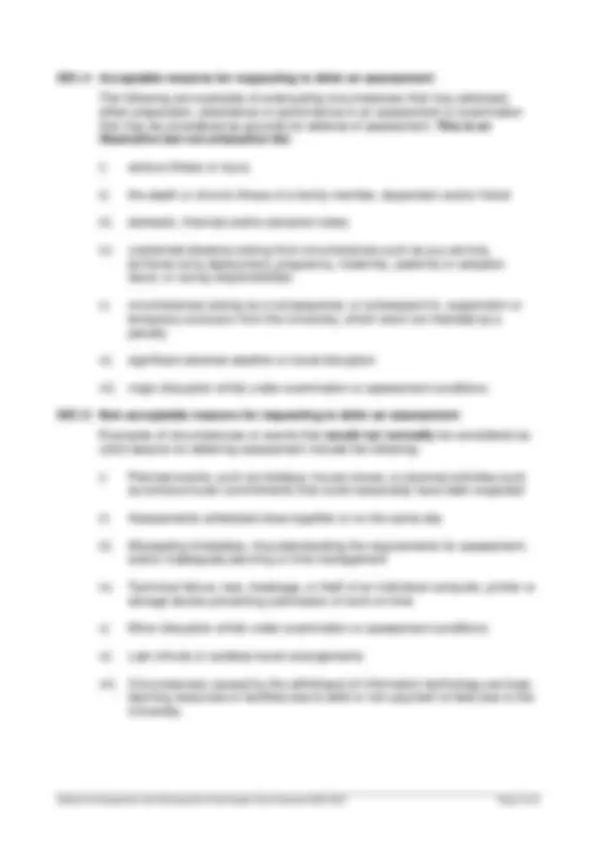
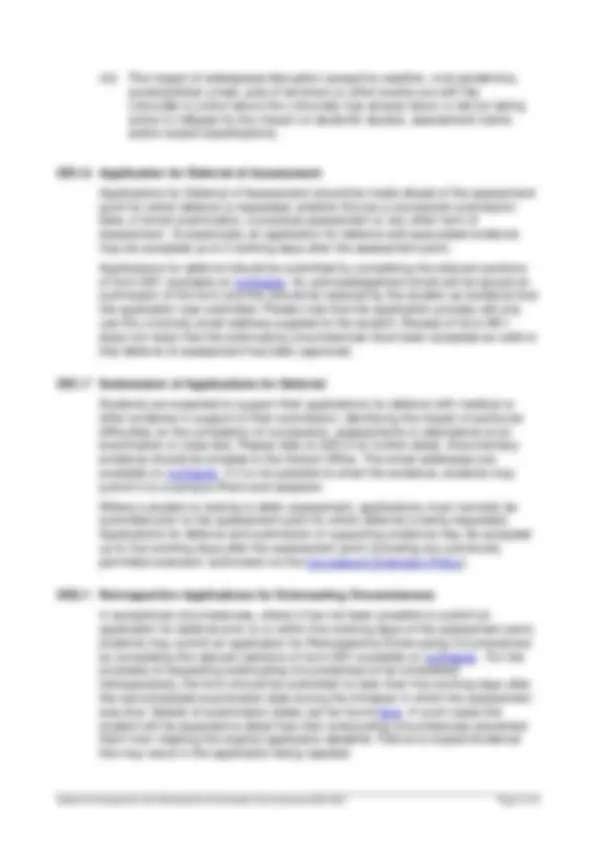
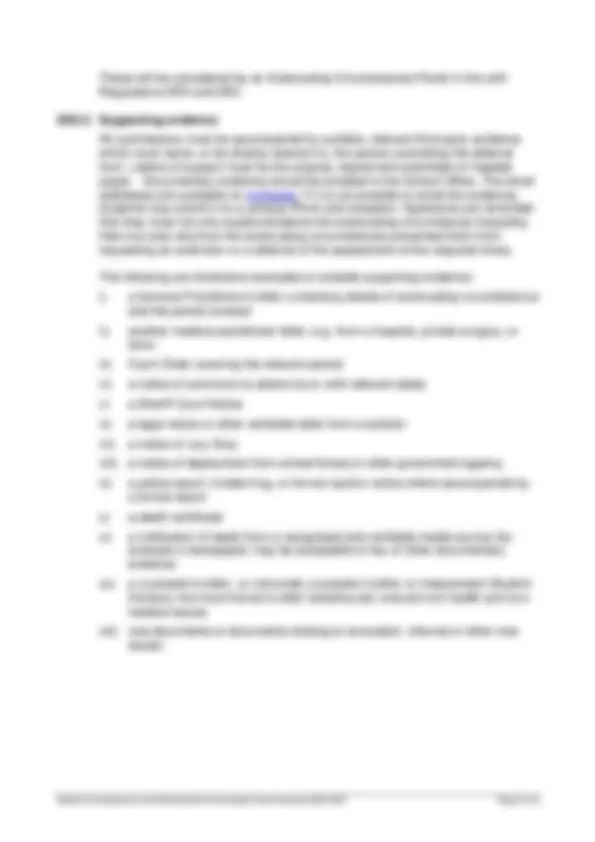
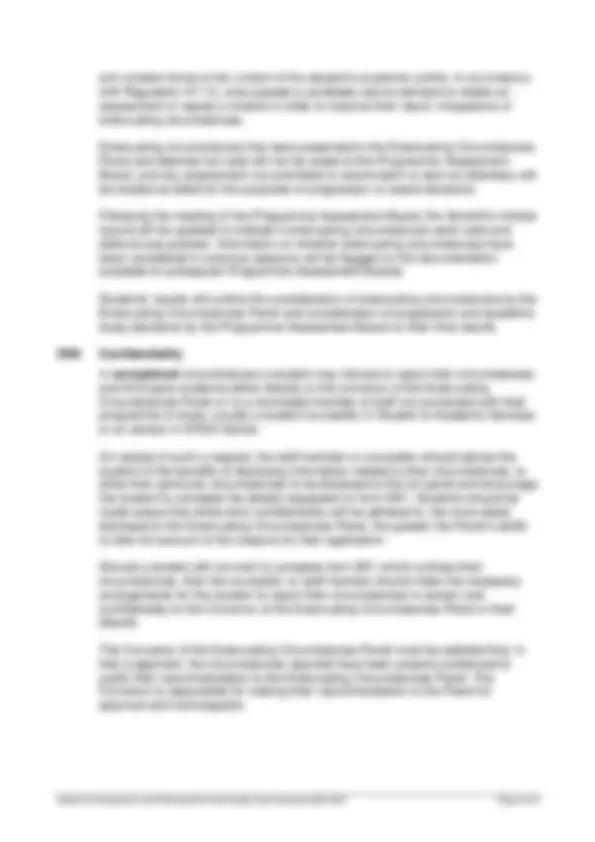
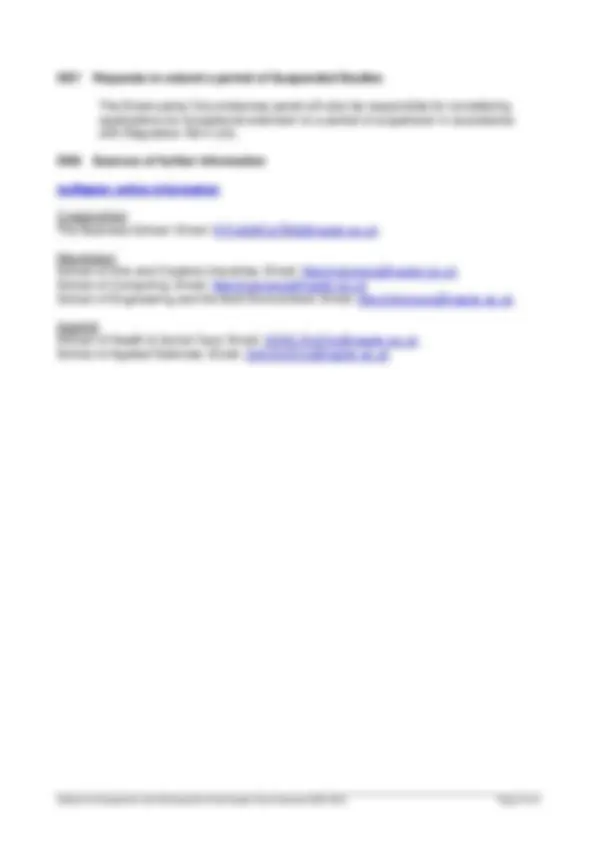


Study with the several resources on Docsity

Earn points by helping other students or get them with a premium plan


Prepare for your exams
Study with the several resources on Docsity

Earn points to download
Earn points by helping other students or get them with a premium plan
Community
Ask the community for help and clear up your study doubts
Discover the best universities in your country according to Docsity users
Free resources
Download our free guides on studying techniques, anxiety management strategies, and thesis advice from Docsity tutors
The regulations and procedures for matriculated students of Edinburgh Napier University who wish to defer an assessment or apply for retrospective extenuating circumstances due to exceptional and unforeseeable circumstances. It covers definitions, application processes, acceptable reasons, unacceptable reasons, supporting evidence, and decision-making processes.
What you will learn
Typology: Exercises
1 / 9

This page cannot be seen from the preview
Don't miss anything!






Contents Page DE 1 Extenuating circumstances DE1.1 Definition of Extenuating Circumstances DE1. 2 Fit to Sit 2 DE1. 3 Deferral of Assessment 2 DE1. 4 Examples of Extenuating Circumstances 2 DE1.5 Examples of Circumstances Unlikely to Merit Consideration
DE1.6 Application for Deferral of Assessment 4 DE 2 Submission of Applications for Deferral 4 DE2.1 Retrospective Application for Extenuating Circumstances
DE2. 2 Supporting Evidence 5 DE 3 Advice and guidance 6 DE 4 Extenuating Circumstances Panel 6 DE4.1 Constitution of an Extenuating Circumstances Panel 6 DE4.2 School Extenuating Circumstances Panel 6 DE4.3 Schedule of Meetings 7 DE 5 Procedure and decision making process of an Extenuating Circumstances Panel
DE 6 Confidentiality 8 DE7 Requests to extend a period of Suspended Studies 9 DE8 Sources of further information 9
DE 1 Deferral of Assessment and Extenuating Circumstances These regulations apply to all matriculated students of Edinburgh Napier University who believe that their ability to complete an assessment of any type has been adversely affected by extenuating circumstances that have had a detrimental effect on their academic studies or progression. All schools will appoint an Extenuating Circumstances Officer, who will be an experienced member of academic or administrative staff, who will administer the Extenuating Circumstances procedure. These regulations should be read in conjunction with the University’s Coursework Extension policy. DE1.1 Definition of Extenuating Circumstances The University considers extenuating circumstances, for the purpose of these regulations, to be exceptional adverse circumstances or events which were unforeseeable or unpreventable, for which the student subject to the circumstances could not take reasonable care to avoid, and which occurred at a significant period within the academic year or trimester. DE1.2 Fit to Sit The principle of Fit to Sit is that a student who attends, submits or participates in any form of assessment, is declaring themselves to be in a position to do so and cannot subsequently claim that their performance was adversely affected by extenuating circumstances. The following actions are available where students’ work is compromised by extenuating circumstances: Extension – the student requests an extension to the submission date for coursework. To do this, students should refer to the Coursework Extensions Policy Deferral of Assessment – student is unable to complete assessment at the scheduled time and requests deferral of assessment to the next diet. See Retrospective Extenuating Circumstances – where deferral has not been possible the student applies retrospectively for extenuating circumstances to be considered. DE1.3 Deferral of Assessment Students who feel that they are unable to attend, submit or participate in any form of assessment, or that their preparation for assessment has been compromised as a result of extenuating circumstances, are permitted to defer that assessment to the next assessment diet, subject to approval of an application for Deferral of Assessment. Approved deferrals are reported to the student’s Programme Assessment Board. Deferral of assessment may have an impact on progression or award decisions.
viii) The impact of widespread disruption caused by weather, viral pandemics, social/political unrest, acts of terrorism or other events out with the University’s control where the University has already taken or will be taking action to mitigate for the impact on students’ studies, assessment marks and/or award classifications. DE1.6 Application for Deferral of Assessment Applications for Deferral of Assessment should be made ahead of the assessment point for which deferral is requested, whether this be a coursework submission date, a formal examination, a practical assessment or any other form of assessment. Exceptionally an application for deferral and associated evidence may be accepted up to 5 working days after the assessment point. Applications for deferral should be submitted by completing the relevant sections of form DE1 available on myNapier. An acknowledgement email will be issued on submission of the form and this should be retained by the student as evidence that the application was submitted. Please note that the application process will only use the university email address supplied to the student. Receipt of form DE does not mean that the extenuating circumstances have been accepted as valid or that deferral of assessment has been approved. DE1.7 Submission of Applications for Deferral Students are expected to support their applications for deferral with medical or other evidence in support of their submission, identifying the impact of particular difficulties on the completion of coursework, assessments or attendance at an examination or class test. Please refer to DE2.2 for further detail. Documentary evidence should be emailed to the School Office. The email addresses are available on myNapier. If it is not possible to email the evidence, students may submit it to a campus iPoint and reception. Where a student is looking to defer assessment, applications must normally be submitted prior to the assessment point for which deferral is being requested. Applications for deferral and submission of supporting evidence may be accepted up to five working days after the assessment point (including any previously permitted extension authorised via the Coursework Extension Policy). DE 2 .1 Retrospective Applications for Extenuating Circumstances In exceptional circumstances, where it has not been possible to submit an application for deferral prior to or within five working days of the assessment point, students may submit an application for Retrospective Extenuating Circumstances by completing the relevant sections of form DE1 available on myNapier. For the purposes of requesting extenuating circumstances to be considered retrospectively, the form should be submitted no later than five working days after the last scheduled examination date during the trimester in which the assessment was due. Details of examination dates can be found here. In such cases the student will be expected to detail how their extenuating circumstances prevented them from meeting the original application deadline. Failure to explain/evidence this may result in the application being rejected.
These will be considered by an Extenuating Circumstances Panel in line with Regulations DE4 and DE5. DE2. 2 Supporting evidence All submissions must be accompanied by suitable, relevant third party evidence which must name, or be directly relevant to, the person submitting the deferral form. Letters of support must be the original, signed and submitted on headed paper. Documentary evidence should be emailed to the School Office. The email addresses are available on myNapier. If it is not possible to email the evidence, students may submit it to a campus iPoint and reception. Applicants are reminded that they must not only explain/evidence the extenuating circumstance impacting them but also why/how the extenuating circumstances prevented them from requesting an extension or a deferral of the assessment at the requisite times. The following are illustrative examples of suitable supporting evidence: i) a General Practitioner’s letter containing details of extenuating circumstances and the period covered ii) another medical practitioner letter, e.g. from a hospital, private surgery, or clinic iii) Court Order covering the relevant period iv) a notice of summons to attend court, with relevant dates v) a Sheriff Court Notice vi) a legal notice or other verifiable letter from a solicitor vii) a notice of Jury Duty viii) a notice of deployment from armed forces or other government agency ix) a police report, incident log, or formal caution notice where accompanied by a formal report x) a death certificate xi) a notification of death from a recognised and verifiable media source (for example a newspaper) may be acceptable in lieu of other documentary evidence xii) a counsellor’s letter, or University counsellor’s letter or Independent Student Advisory Services Advisor’s letter detailing any relevant non health and non- medical issues xiii) visa documents or documents relating to revocation, tribunal or other visa issues.
iv) Members of School academic staff v) A member of academic staff from another School vi) A Clerk to the Panel who will keep a confidential record of membership, proceedings and all decisions. DE4.3 Schedule of meetings In addition to considering applications for deferral as required, the Extenuating Circumstance Panel will meet no later than two days prior to the Programme Assessment Board to consider applications for retrospective extenuating circumstances. DE 5 Procedure and decision making process of an Extenuating Circumstances Panel In considering applications, the Extenuating Circumstances Panel will take the following actions in respect of each submission, and will report to the relevant Programme Assessment Board. The Panel will make a formal decision on each submission and will be entitled to take into account any other relevant information as they see fit, except the progression and award decisions of individual students. Three categories of decision can be made by the Extenuating Circumstances Panel: i) The Extenuating Circumstances Panel considers that extenuating circumstances significantly have or will affect the student’s performance and the Panel records such submissions as Valid and approves the deferral of assessment. ii) The Extenuating Circumstances Panel considers that extenuating circumstances did not significantly affect the student’s performance, have been submitted too late for consideration or they fall out-with the definition of extenuating circumstances. The Panel records such submissions as Not Valid and rejects the deferral of assessment. iii) There was insufficient information provided on which the Extenuating Circumstances Panel could make a decision and therefore the decision has been deferred, pending receipt of further evidence. There is no right of appeal against the decision of the Extenuating Circumstances Panel but students whose application for deferral was rejected may subsequently apply using the Retrospective Extenuating Circumstances process detailed in regulation DE2.1, if new information or evidence has become available. The extenuating circumstances decision taken will be recorded in the Programme Assessment Board’s minute and taken into account as the Programme Assessment Board makes academic decisions in relation to a student’s academic progression. In the case where a student has passed a module for which Retrospective Extenuating Circumstances were approved, the Programme Assessment Board
will consider these in the context of the student’s academic profile. In accordance with Regulation A7.1 3 , once passed a candidate cannot demand to retake an assessment or repeat a module in order to improve their result, irrespective of extenuating circumstances. Extenuating circumstances that were presented to the Extenuating Circumstances Panel and deemed not valid will not be raised at the Programme Assessment Board, and any assessment not submitted or examination or test not attended, will be treated as failed for the purposes of progression or award decisions. Following the meeting of the Programme Assessment Board, the student’s module record will be updated to indicate if extenuating circumstances were valid and deferral was granted. Information on whether extenuating circumstances have been considered in previous sessions will be flagged on the documentation available to subsequent Programme Assessment Boards. Students’ results will outline the consideration of extenuating circumstances by the Extenuating Circumstances Panel and consideration of progression and academic study decisions by the Programme Assessment Board on their final results. DE 6 Confidentiality In exceptional circumstances a student may choose to report their circumstances and third party evidence either directly to the convenor of the Extenuating Circumstances Panel or to a nominated member of staff not connected with their programme of study; usually a student counsellor in Student & Academic Services or an advisor in ENSA Advice. On receipt of such a request, the staff member or counsellor should advise the student of the benefits of disclosing information related to their circumstances, to allow their particular circumstances to be disclosed to the full panel and encourage the student to complete the details requested on form DE1. Students should be made aware that whilst strict confidentiality will be adhered to, the more detail disclosed to the Extenuating Circumstances Panel, the greater the Panel’s ability to take full account of the reasons for their application. Should a student still not wish to complete form DE1 which outlines their circumstances, then the counsellor or staff member should make the necessary arrangements for the student to report their circumstances in person and confidentially to the Convenor of the Extenuating Circumstances Panel or their depute. The Convenor of the Extenuating Circumstances Panel must be satisfied that, in their judgement, the circumstances reported have been properly evidenced to justify their recommendation to the Extenuating Circumstances Panel. The Convenor is responsible for making their recommendation to the Panel for approval and homologation.